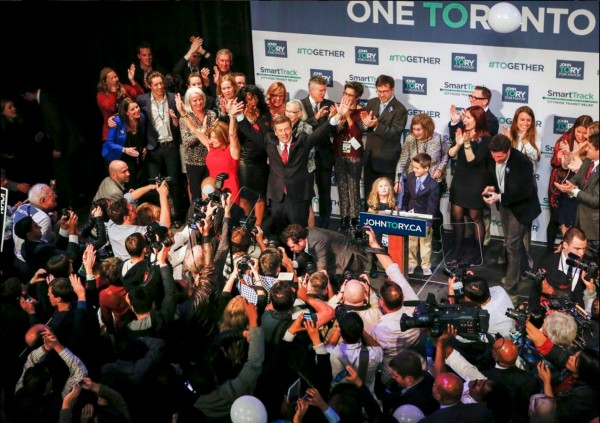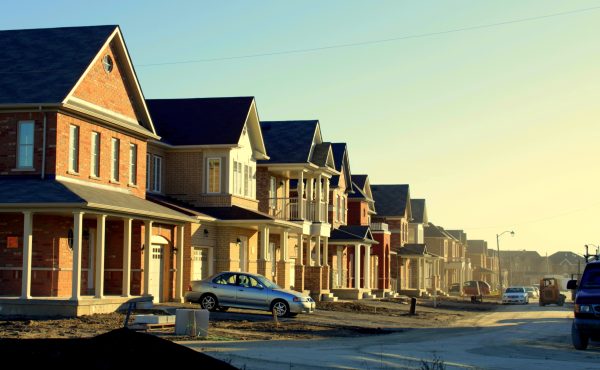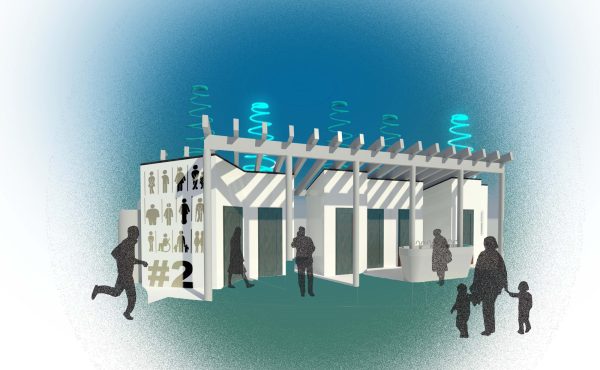My operating hypothesis about the way mayor-elect John Tory plans to run council is that he’s going to try to emulate Mel Lastman’s political approach to the first post-amalgamation council, except without the borscht-belt shtick.
Elected, as Tory was, with a red-blue coalition in the aftermath of a bitter fight against the Harris Tories, Lastman (and his chief of staff Rod Phillips) took care to keep the left under wraps by offering key councillors – Jack Layton, Olivia Chow, and the then novice David Miller – jobs with enough policy heft to keep them busy and onside. Layton was the environment guy. Chow became the children’s advocate. Miller, a lawyer, was tasked with over-seeing the post-amalgamation transition process. In exchange, Mel got the support he needed for his big project: the Olympic bid, which, he reckoned, needed unanimous support in order to be taken seriously.
The early days of every new council is marked by this sort of horse-trading, as the mayor looks for support for his or her key items in exchange for appointments, favoured local projects and the like.
Rob Ford played that game, too, but he pretended the downtown didn’t exist, or didn’t deserve a voice. He stacked the executive committee with loyalists and gave the key council jobs to his closest allies. It was a classic Stephen Harper tactic: all that matters is getting past 50%. After that, it’s all bare-knuckle partisanship.
Tory, I predict, will be somewhat more, uh, liberal in his approach. He won votes right across the city, and in large numbers. He’s going to make the unite-Toronto theme a leitmotif of his mayoralty. And as one advisor told me last night, he doesn’t view the city through an ideological filter.
What’s that mean in practice? I would expect to see a few centre-left councillors, and/or downtown-midtowners, receive either significant appointments or tasked with special projects (affordable housing advocate, a youth employment czar, etc.), a la Mel. Remember, too, that John Filion endorsed Tory, and Kristyn Wong-Tam was conspicuously non-aligned, despite her left-of-centre politics.
But to build out the large, reliable and replicable council majorities that he’ll need to breath life into his slogan, Tory’s got to turn to parts of the city that didn’t necessarily vote for him in droves – central/north Etobicoke, and much of Scarborough. Still, as I tallied up the ward-by-ward breakdown last night, it seemed clear that Tory, despite having won a smaller proportion of the popular vote than Ford did in 2010, can count on early support from at least 30 councillors, and perhaps more, depending on how desperate the staunchest Rob Ford allies (Frances Nunziata, Cesar Palacio, Vincent Crisanti, etc.) are for status positions.
He’ll have the backing of council’s obedient Liberals, including several in Scarborough, and almost complete control over two Conservative-connected, Tory-endorsed newcomers – Christin Carmichael Greb, daughter of Don Valley West Tory MP John Carmichael; and Jon Burnside, who defeated John Parker.
It wouldn’t surprise me to see some of the class of 2010 councillors – Josh Colle, Jaye Robinson and Ana Bailao – emerge as key players. Look for John Campbell, a former Toronto District School Board chair elected in Etobicoke, to take on a prominent role. Tory will almost certainly give the budget duties to a sentient conservative (e.g., Denzil Minnan-Wong), while the TTC chair, I’m guessing, may find its way to a councilor from Scarborough, whose residents and MPPs will need to be reminded regularly that John Tory’s Toronto includes the transit-deserving table lands east of Victoria Park.
As for the buffoons and the loud-mouths (Exhibit A: Jim Karygiannis), it will be interesting to see whether Tory will attempt to establish connections, as per the old political edict that it’s important to keep your friends close and your enemies closer, or adopt a more ruthless approach and simply marginalize them.
Some simply don’t warrant much in the way of coddling. David Shiner will bitch no matter what happens, and it won’t amount to much. Giorgio Mammolitti, with a police investigation about suspect fundraising hanging over his head, will be easily marginalized by someone like Tory, who, I suspect, will want to keep a conspicuous distance from someone so publicly tainted.
But Ford last night all but promised to challenge Tory in 2018. That’s bluster of course. After round three of his cancer treatment, he looks terrible, and should probably resist tempting the fates by steering clear of predictions that far out.
Yet if he does go into remission, he’ll almost certainly pick up from where he left off – yelping about waste, disrupting council, casting symbolic votes, and thereby drawing media attention. It worked once, and he’s too obdurate to think it wouldn’t work again.
In short, Tory will never be able to do anything that satisfies Ford. When David Miller became mayor, he attempted to placate Ford’s political ancestor, Michael Walker; it worked for a little while, but then Walker, another attention hound, realized he’d get more ink by objecting than by going along for going’s sake.
Even cancer-ridden, Ford’s not going to change, so one of the telling details about Tory’s approach will be whether he and his team recognize the futility of attempting to make common cause with a sworn, and self-involved, political enemy.
My hope is that Tory’s strategy with the hard-right rump on council will be to find those few who can be lured into the big tent, and then ignore the rest. That kind of discipline won’t be easy. After all, he has presented himself to Toronto as the civic-minded unifier who plans to slay council’s corrosive partisanship en route to a forward-moving future, one, presumably, that eventually leads to a second term.
Like Mel, he’ll have to be relentlessly Machiavellian to get there.






One comment
Worth pointing out that, in absolute terms, Tory got more votes than Rob Ford did in 2010.